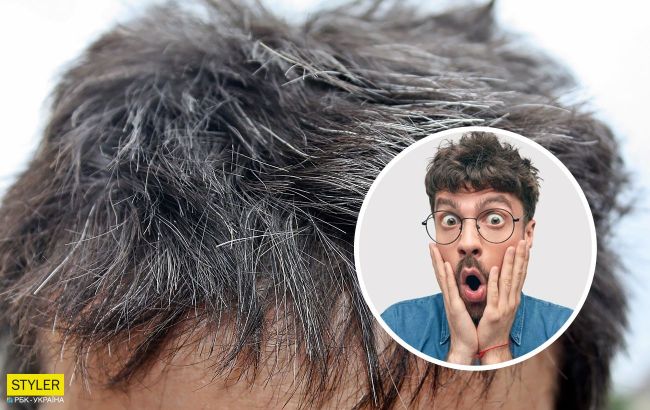6 reasons your hair may turn gray beyond just stress
 Why hair turns gray (RBC-Ukraine collage)
Why hair turns gray (RBC-Ukraine collage)
Gray hair is a common occurrence that comes with aging for most people. It's a visible indicator, but have you ever wondered about the underlying reasons for this transformation? The New York Post explains the factors behind hair color changes.
Why hair turns gray
The graying of hair occurs due to a gradual decline in the number of pigment cells in the hair follicles. Our hair's natural color is determined by melanin, a pigment produced by specialized cells called melanocytes. These cells inject melanin into the hair cells, defining their natural shade, whether it be light, brown, black, or red.
As we age, melanocytes produce less melanin, leading to a gradual reduction in hair pigment. Eventually, some hair follicles cease melanin production entirely, resulting in the appearance of gray or white hair.
Reasons for hair graying
Genetics
Genetics plays a significant role in the onset and pace of hair turning gray. The terms and speed of this process are largely determined by your genetic code. If premature graying is prevalent in your family, there is a higher likelihood that you may also experience it.
Specific genes are responsible for regulating melanin production. Variations in these genes can influence the amount of melanin your body produces and the rate at which pigment cells in your hair follicles shrink over time.
Stress
Stress, while not a direct cause of gray hair, has a correlation with premature graying. Prolonged stress may impact the body, including the potential acceleration of the graying process.
Excess cortisol produced during prolonged stress can impact normal bodily functions, including the destruction of melanocyte stem cells crucial for hair pigment production.
This disruption may lead to reduced melanin production and premature graying. While not the sole cause, managing stress through relaxation, mindfulness, and a healthy lifestyle can indirectly help slow down graying.
Smoking
Smoking is linked to premature aging, including early graying of hair. The chemicals and toxins in cigarettes can adversely affect the body, impacting hair follicles and melanin production.
Harmful components of tobacco smoke may induce oxidative stress, damaging cells. This stress can disrupt melanocytes' normal functioning, resulting in reduced melanin production and premature graying.
Deficiency of nutrients
Nutrient deficiencies can potentially contribute to premature graying, although a direct cause-and-effect relationship between specific nutritional deficiencies and gray hair is not always clear.
Maintaining a balanced diet rich in essential nutrients is critical for overall health, including your hair.
Certain nutrients, such as B12, D, and E vitamins, and minerals like copper and iron, play a crucial role in melanin production—the pigment responsible for hair color. Deficiencies in these nutrients can impact melanin production and the overall health of hair. When the body lacks these essential nutrients, it can affect the health and function of hair follicles, potentially leading to premature graying.
Medical conditions
Certain diseases can impact the general state of health and, consequently, affect hair pigmentation. Some of these conditions include:
Vitiligo: A skin condition where areas of the skin lose melanocytes, resulting in white patches. Vitiligo can sometimes also affect the hair, causing premature graying or graying in the affected areas.
Autoimmune diseases: Certain autoimmune conditions can influence the body's immune response, leading to damage to melanocytes or disrupting melanin production.
Thyroid diseases: Changes in thyroid hormone levels, especially hypothyroidism, can affect various body functions, including hair health.
Impact of pollutants
Pollutants such as car emissions, industrial pollutants, heavy metals, and certain chemicals can cause oxidative stress in the body, damaging melanocytes. Prolonged exposure to pollutants can impact the cells' ability to produce melanin. Consequently, hair may turn gray prematurely or lose its natural pigment.
Minimizing exposure to pollutants through lifestyle changes, reducing exposure to cigarette smoke, and living in a less polluted environment can help support overall hair health and potentially slow premature graying.
This material is for informational purposes only and should not be used for medical diagnosis or self-treatment. Our goal is to provide readers with accurate information about symptoms, causes, and methods of detecting diseases. RBС-Ukraine is not responsible for any diagnoses that readers may make based on materials from the resource. We do not recommend self-treatment and advise consulting a doctor in case of any health concerns.

